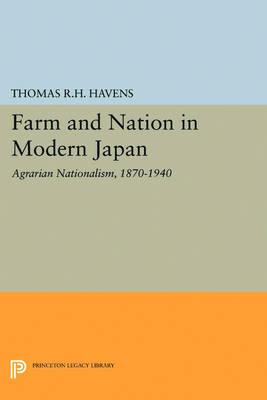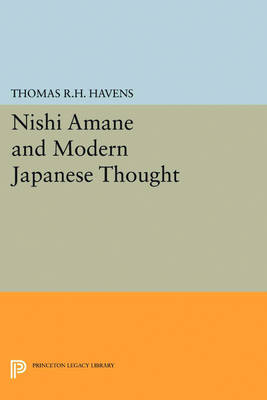Princeton Legacy Library
4 total works
A study of agrarian thought in prewar Japan, this bonk concentrates on the developing fissure between official and rural conceptions of nationalism in the late nineteenth and early twentieth centuries. Professor Havens analyzes the response of Japanese farmers and their spokesmen to the pursuit of modernization during the Meiji and Taisho periods.
Through a critical examination of writings and speeches of major farm ideologues, including Gondo Seikyo, Tachibana Kozaburo, and Kato Kanji, the author examines the ways in which agrarianist theories shaped modern Japanese nationalism and the extent to which rural ideologies triggered political violence in the turbulent 1930s. He then focuses on the romantic rural communalism of the 1920s and 1930s as an example of antigovernment nationalism designed to rescue the Japanese people at large from bureaucracy, capitalism, and urbanization.
Based on extensive research in modern Japanese ideological, political, and economic materials, the study offers new insight into the early twentieth century revolution in nationality sentiments and provides fresh grounds for doubting the state's monopoly on public loyalties during the years immediately preceding Pearl Harbor.
Originally published in 1974.
The Princeton Legacy Library uses the latest print-on-demand technology to again make available previously out-of-print books from the distinguished backlist of Princeton University Press. These editions preserve the original texts of these important books while presenting them in durable paperback and hardcover editions. The goal of the Princeton Legacy Library is to vastly increase access to the rich scholarly heritage found in the thousands of books published by Princeton University Press since its founding in 1905.
A nineteenth-century aristocrat, Nishi Amane (1829-1897) was one of the first Japanese to assert the supremacy of Western culture. He was sent by his government to Leiden to study the European social sciences; on his return to Japan shortly before the climactic Meiji Restoration of 1868 he introduced and adapted European utilitarianism and positivism to his country's intellectual world. To modernize, Nishi held, Japan must cast off the bonds of the Confucian world-view in order to adopt new principles of empirical scholarly investigation and new standards of self-improvement. Though a Confucian by upbringing, Nishi became thoroughly committed to Western intellectual values in his programs for the new Japanese society. In his roles of teacher, writer, and government administrator, he was influential at one of the most critical times in Japan's history.
Originally published in 1970.
The Princeton Legacy Library uses the latest print-on-demand technology to again make available previously out-of-print books from the distinguished backlist of Princeton University Press. These editions preserve the original texts of these important books while presenting them in durable paperback and hardcover editions. The goal of the Princeton Legacy Library is to vastly increase access to the rich scholarly heritage found in the thousands of books published by Princeton University Press since its founding in 1905.
Professor Havens analyzes the efforts of Japanese antiwar organizations to portray the war as much more than a fire across the sea" and to create new forms of activism in a country where individuals have traditionally left public issues to the authorities. This path-breaking study examines not only the methods of the protesters but the tightrope dance performed by Japanese officials forced to balance outspoken antiwar sentiment with treaty obligations to the U.S.
Originally published in 1987.
The Princeton Legacy Library uses the latest print-on-demand technology to again make available previously out-of-print books from the distinguished backlist of Princeton University Press. These editions preserve the original texts of these important books while presenting them in durable paperback and hardcover editions. The goal of the Princeton Legacy Library is to vastly increase access to the rich scholarly heritage found in the thousands of books published by Princeton University Press since its founding in 1905.



